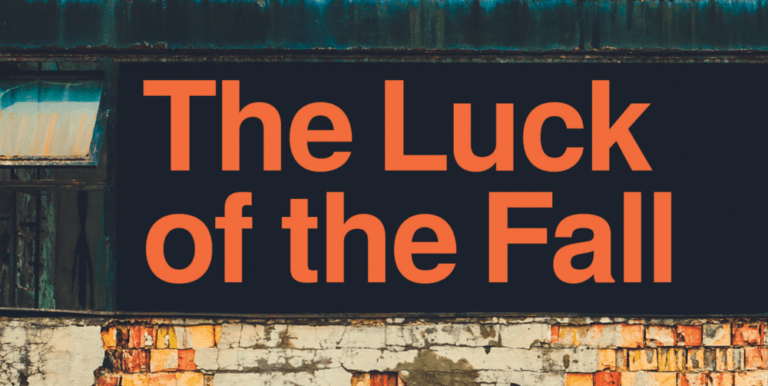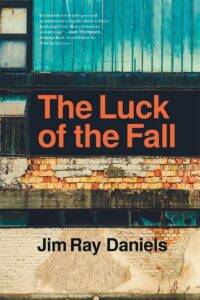“Jim Daniels writes with grace and unsentimental sympathy about ordinary, hard-edged lives, their celebrations and failures and strivings.” —Jean Thompson, National Book Award finalist for Who Do You Love
From the Publisher: “In The Luck of the Fall, characters get lost; they fall, but the falls shape their lives in ways that might even be called ‘lucky’—if luck is defined as survival, despite the scars left behind. They take consolation in their lack of prizes, in the clarity of their failures, while approaching the future with gallows humor and faith in cynicism. Some stories read like dramatic monologues in the longer play of lives along Eight Mile Road on the edge of Detroit, a landmark location throughout Daniels’s six other fiction collections. Among the looming hulks of abandoned factories, near-nihilistic lives struggle in the absence of the comforting shadows those factories provided. Some keep score, some don’t, as they search for validation, however brief, before the curtain comes down and anonymity returns. COVID shows up with its masked consequences, along with addiction, divorce, unwanted pregnancy, and mental illness. None of these characters fit in, but all are trying to keep from being squeezed out entirely. In The Luck of the Fall, the logic of the heart wins out, even as the characters are picking up the pieces of their broken lives, looking for something shiny called hope.”
More info About the Author: “Jim Ray Daniels’ six previous fiction collections have received many prizes, including a Foreword INDIES Book of the Year Award, an Independent Publisher Book Award, a Midwest Book Award, a Michigan Notable Book of the Year Award, and a Finalist Award for the Paterson Fiction Prize. He has authored numerous poetry collections, four produced screenplays, and has edited six anthologies, including RESPECT: The Poetry of Detroit Music. He is the Thomas Stockham Baker University Professor of English Emeritus at Carnegie Mellon University. A native of Detroit, he lives in Pittsburgh and teaches in the Alma College low-residency MFA program.”
October’s streetlight had not yet thrown its damp-blanket chill over us on Pearl Street, but it had given notice—the cold in the back of our throats that signaled change. On our drab street of tract three-bedroom ranches surrounding the Ford plant on Eight Mile Road on the edge of Detroit, a single tree had been planted uniformly in the middle of each tiny, ragged lawn. The series of dotted i’s down the street—maple, oak, maple, oak—had yet to fill out, and, in fact, many had already died and not been replaced, as if the dots had been an unnecessary frill of punctuation. As dusk fell, the small clusters of changing leaves resembled small campfires until darkness snuffed them out entirely.
When our fathers weren’t working overtime, we all ate at 5:30. If someone had a dinner bell, they could safely ring it at that hour and bring all the children in the neighborhood home to wash our hands and say grace and wolf down whatever pale meat or overcooked spaghetti or other dried-then-boxed or frozen-then-thawed or canned substance fried or boiled or heated up in a saucepan. We were proud of our uniform blandness—we leaned against it for comfort. The only fish we ate had been bullied into squares, breaded and frozen, so we never connected what swam to what we consumed. Even during Lent, when we abstained from meat and tackled fish and chips on Fridays from the K of C in their squeaky Styrofoam containers, the fish was disguised by the Rorschach-test shapes of thick breading.
My friend Cathy’s dog Fishstick bit me on the ring finger of my left hand, leaving a scar below the knuckle as a warning to never get married or maybe just never reach too quickly for anything. To wait my turn and take what was given without expectation.
*
If you looked out our front window, you could see Paula and Cathy, both eleven, a year younger than me, sprawled in the slightly damp grass, cool to the touch, practicing cheers on Paula’s front lawn in the after-dinner in-between—they lived three doors down from each other. Careless laughter and imprecise cartwheels. They’d never be cheerleaders—we probably all knew that. They’d both get pregnant in high school—none of us imagined that. I was a young idiot-boy who had known them from birth and couldn’t handle the shade their pregnancies threw on our street. It stung me hard and deep, like a long breath of that new chill air.
*
The Ford plant turned our fathers into worker ants on the ant hill and our mothers into worker ants in the neighborhood. We lived in a company town without a town—the frontier of the Ford plant—the Great Prairie, and we were all prairie dogs—the . . . Oh, forget it. I’m lost on my way across the street to cheer the cheerleaders. They knew all the routines by heart, despite their lack of pompoms, uniforms, and the untouchable wholesome aura of the official cheerleaders who cheered on the official football players under the lurid glare of the lights on the Eight Mile High football field that we could see from our sidewalk, hulking over the low shoulders of our tiny houses.
Our neighborhood guys played tackle football without pads in the swampy field on the edge of the woods next to Schofield Elementary on weekend afternoons. In the street, we played two-hand touch. Two-hand shove. Everything and nothing out of bounds. We beat on each other out of reckless affection or subconscious preparation for our assembly-line futures. Our favorite game was Free-For-All, a brutal game without rules in which we jumped on each other, falling into a ragged pile, randomly fighting until someone got hurt. Fun, we called it, unleashing our pent-up whatever on the anonymous streets of identical houses. We’d never play for the school team. That required anonymous haircuts and sincerity. That required faith in their scoreboard.
*
Our families each had one car, and those cars were driven daily on the giant sea of asphalt called Eight Mile Road, gashed by yellow lines so everyone knew their places, where to dock their dinghies.
Despite our inability to circle our station wagons, we turned inward with unspoken love and outward with spoken defiance. On our block, we did not judge. Tough luck, we said softly to those girls as their bellies rounded, our heads tilting toward them, since we never spoke the words I love you to anyone. We wanted to gently touch those bellies, but we were shy and afraid and maybe superstitious about that luck.
None of the school’s cheerleaders got pregnant. I think their advisor, Mrs. Fountain, provided them with more useful advice and perhaps even some concrete forms of protection. Or perhaps they were not even—no, they had to be.
*
We never found a four-leafer in our weedy lawns, though they included plenty of clover. We all knew the stupid trick of squeezing two stems together so it looked like four leaves, yet we could not stop ourselves from doing it. Or from rubbing dandelions under our necks to see if we liked butter or were in love or both. I learned later that it was supposed to be buttercups, a kind of flower. All I know is that if you rub dandelions hard enough, they can turn anything yellow.
*
We kissed that evening, the three of us, careless as those cartwheels, on that ragged grass beginning its brown journey, uncut since Labor Day. They took turns kissing me and laughing, sprawling away onto their backs, then leaning in again. Our cold noses and fingers touched. Jazzed up by proximity and darkness, we bristled in our thin fall jackets. By newfound strength and range of motion. By curious tingling, the static electricity of the startling awareness of opposites. Cold noses, warm cheeks.
*
Hey, what are you guys doing?” I asked.
Cheers, what do you think?”
“Yeah,” I nodded. I was no wise guy with words. How we got to kissing, I’m still not sure. I plopped down on the grass, and they plopped down too. As if we were slipping beneath some invisible wire, escaping unsnagged. I could hear Fishstick barking at the fence three doors down.
“Fishstick’s lonely,” Cathy said.
“He shouldn’t be biting people then,” Paula said, and she grabbed my hand where it pushed into the grass. I lost my balance and fell flat on my back. “Let’s see that finger,” Paula said. The scab was hardening and narrowing into what would be its permanent scar. “I’ll kiss your boo-boo,” she said.
“No, I’ll kiss your boo-boo. It was my dog,” Cathy said, and they laughed and fell, wrestling on top of me, twisting my arm around so we got all tangled and touching, and then we stopped and breathed heavily enough to warm each other’s faces. That might have been enough for any other cool October evening in our back catalog. But it wasn’t enough on this night. Sweet clover breath caressed my face as we lay stunned and chilled, magnifying the double digits of our young hearts.
Who kissed who first didn’t matter much once we started. Soon, they were swiveling my head back and forth to alternate kissing my chapped lips, each of them trying to outdo the other in duration and exaggerated smacking that soon faded into something quieter, more serious. Me, I did no smacking at all.
This excerpt was published here courtesy of the author and publisher and should not be reprinted without permission.


























